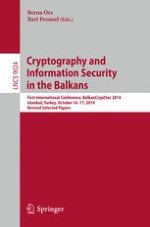2015 | OriginalPaper | Buchkapitel
Timed-Release Secret Sharing Schemes with Information Theoretic Security
verfasst von : Yohei Watanabe, Junji Shikata
Erschienen in: Cryptography and Information Security in the Balkans
Aktivieren Sie unsere intelligente Suche, um passende Fachinhalte oder Patente zu finden.
Wählen Sie Textabschnitte aus um mit Künstlicher Intelligenz passenden Patente zu finden. powered by
Markieren Sie Textabschnitte, um KI-gestützt weitere passende Inhalte zu finden. powered by
